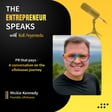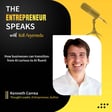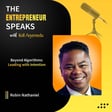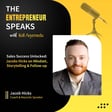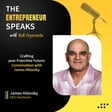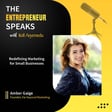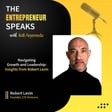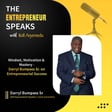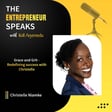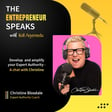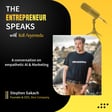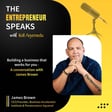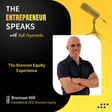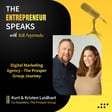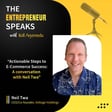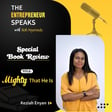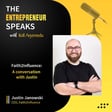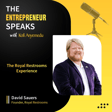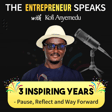Become a Creator today!Start creating today - Share your story with the world!
Start for free
00:00:00
00:00:01

Technology in Healthcare
Harry Glorikian is an influential global business expert with more than 3 decades of experience building successful ventures in North America, Europe, Asia, and the rest of the world. He is well known for his achievements in life sciences, healthcare, diagnostics, healthcare IT, and the convergence of these areas. He is a sought-after speaker, frequently quoted in the media, and regularly asked to assess, influence, and be part of innovative concepts and trends.
In this episode Harry talks about AI, life sciences, tech, and data in healthcare.
Enjoy !!
Transcript
Introduction and Guest Excitement
00:00:01
Speaker
Hello friends and welcome to this episode of the Entrepreneur Speaks podcast. My name once again is Kofi Animeju. I'm super excited to host my guest today on this episode.
00:00:19
Speaker
My guess is an influential global business expert with more than three decades of experience building successful ventures in North America, Europe, Asia, and the rest of the world.
00:00:33
Speaker
My guest, Harry Lorican, is well known for his achievement in life sciences, healthcare, diagnostics, healthcare IT, and the convergence of these areas.
Guest Background and Achievements
00:00:46
Speaker
He's a sought after speaker, frequently quoted in the media, and regularly asked to assess, influence, and be part of innovative concepts and trends.
00:00:58
Speaker
He holds four US patents in telecommunication and has others pending. He currently serves as a general partner at Senshia Ventures. Before joining Senshia Ventures, he served as an entrepreneur in residence to GE Ventures. He's also a leading founder of Evidation Health, a digital
00:01:26
Speaker
health startup launches support from GE Ventures and Drawbridge Health, a revolutionary diagnostic sector set startup launches support from GE Ventures.
Childhood and Heritage
00:01:41
Speaker
Welcome to my show, Hari. Thank you very much for having me. Great to be here. You have, you've had an impressive career and I'm sure we're going to learn a lot from you today.
00:01:54
Speaker
So to kick off today's conversation, can you please tell us a bit more about yourself and your childhood? Well, I was born here in the United States to immigrant parents that came here in 1963 after moving around for various reasons and grew up here actually on the West Coast of the United States.
00:02:22
Speaker
And then I now reside in the East Coast in the United States, in Massachusetts, Boston. You know, background, normal childhood, I guess. You know, being the child of immigrants was always an interesting thing. You always felt a little different than everybody else, especially if you come from, you know, ethnic background that's very strong.
00:02:52
Speaker
But I love it. It gives me the best of both worlds. It allows me to work in American culture as well as continue to carry my Armenian heritage. Okay. So walk us through your career and the amazing things you've been involved in all these years.
Career Motivation and Ventures
00:03:15
Speaker
Well, you know, a lot of it was influenced like my dad died when I was very young. So I always knew like I had to like work very hard to, I mean, I don't want to say success was not an option, but it sort of was no matter what it took, we were going to like try to do something. Um, uh, I never thought some of the things that I was working on, whatever happened, but that just, I think that's just life. So you go from one thing to the next thing. Um,
00:03:44
Speaker
But my wife likes to complain and say, you know, that most people are happy doing one thing and I'm not happy unless I'm doing three, four or five things simultaneously. Okay. So what are you currently involved in?
00:04:02
Speaker
So currently, I'm the general partner, as you mentioned, at a venture capital fund where we are making or have made a number of investments. I think the fund we have now 15 different investments that we're involved in. We're in the process of raising capital for our next fund. And I'm also CEO of a
00:04:27
Speaker
data analytics startup. It's an idea that I came up with that I'm gotten off the ground and we're probably going to go and raise money ourselves for that company. And then I also, I'm the host of a podcast and an author and try to write books when I have time. Okay. Okay. So you talk
00:04:53
Speaker
You just talked about the data analytics company. Why did you set up that particular company? What's the story behind the setup of the data analytics company? I think that some of the best ideas are always need-based. So I was starting to feel that I could not keep up with the pace of innovation. There's too much to read, too much to keep track of.
00:05:23
Speaker
So I came up with this crazy idea of could I build a system that could help me understand where I could focus or where I needed to focus. So we ended up designing an analytics platform that helps me understand where things are going and therefore allows me to focus my efforts in those particular areas. But ironically,
00:05:52
Speaker
I'm not the only one that wants to do that. There's a lot of people that would like to have that sort of technology. And so that's now what we're building to commercialize. Oh, okay. Okay.
Role of Technology in Healthcare
00:06:04
Speaker
So from your earlier submissions, you've talked about being engaged in a number of startups and a number of companies. How long have you been engaged in these organizations and how has the journey been so far?
00:06:20
Speaker
So I think I started my first startup when I was 16. So I've been doing startups for, you know, uh, every once in a while I think I'm crazy to do the next one, but I keep doing them. Um, cause you have to be a little, a little crazy cause there's a lot of pain involved when you're trying to get one of these things going. Um, but if you don't, most of the time there's a lot of good,
00:06:48
Speaker
feeling that comes out of it once you get it up and rolling. I'm probably now involved in five or six startups, maybe more, I might be losing track of a few. Well, then I can tell you have a lot of experience, I will be tapping into that experience as we move on in this conversation. So I read, well,
00:07:17
Speaker
doing my research on you that you are quite big when it comes to technology and its relationship with health. So I would like to find out your views on the number of things when it comes to their use or their practice of embedding technology in useful health activities or practices.
00:07:40
Speaker
So what role has technology and artificial intelligence, what role do they have on veteran health? So if you think about it, there are things that are happening inside the body that the body signals that if we could track them or see them that we could actually identify maybe a disease happening before it happens or at least create a baseline
00:08:10
Speaker
of information or basically see something that happens, an aberration that happens while the person doesn't even realize that maybe it's happening. And all these new technologies that the sensors are getting smaller, Wi-Fi being attached to them, that it allows someone to have a technology that can give them information
00:08:37
Speaker
in their daily lives or communicate with their doctor, or you can see how some of these artificial intelligence-based technologies can help a doctor make a decision faster or identify something that they should be focused on that they might have missed.
00:08:59
Speaker
OK, OK, OK. So looking at this and with your experience. So what do you think are some of the new technologies that are yet to come up in this area? Oh, I think there's a number that are already out there. I mean, there's like one on my desk here, which is a small little very thin unit that I'm holding up. And if I put my two fingers on each side,
00:09:28
Speaker
it will automatically do an EKG of my heart from my cell phone. So it'll look at six different parameters of my heart. And then the AI system will look at it and say if there's anything abnormal, and then I can send that information to my doctor and I don't have to go to the hospital. And there are a number of different wearable devices that track my sleep.
00:09:58
Speaker
Actually it's funny because my Apple watch and an app that I had on my phone diagnosed that I had sleep apnea. So sleep apnea is one of those diseases where you hold your breath while you're sleeping or you don't get enough oxygen. So if you, if you know people that snore a lot, the chances are that they have some level of sleep apnea. But if you can diagnose it early and treat it early, it doesn't have the,
00:10:27
Speaker
negative effects on the person's body. So my watch actually was the one that said, Hey, you might have sleep apnea. So you may want to go have this checked. So I didn't have to go to the hospital to find that out. I had it verified at the hospital, but the devices sort of gave me the idea that something was going wrong.
00:10:57
Speaker
So what's the name of the device you showed us? The earlier one, the one you showed us, not the watch. This one is called an Alive Core. It's from a company called Alive Core. And is it on the market? Yes, absolutely. Everything that I'm talking about is totally available today. And the interesting thing about technology is every year the prices start to go down.
00:11:28
Speaker
So it may start out, you know, the first generation may be expensive, but because I think this one when it first came out was $200, $250. And I think now it's down to below $80 right here in the US. So it's continuing to decrease. And if you depending on the country, there may be alternatives that are even more cost effective based on geography.
00:11:57
Speaker
Very, very interesting. So what's the new healthcare business paradigm and how does it affect us as individuals?
Emerging Health Technologies
00:12:06
Speaker
So I believe that the new paradigm is these technologies will allow, first of all, patients to better manage themselves without having to always go to their physician. The second thing is they can communicate with their physician with the data that may help make better decisions.
00:12:28
Speaker
but also doctors and different practitioners can practice in the field. In other words, it's not that they have to be in the hospital all the time, but they can be at someone's home and have a few of these devices and all of a sudden perform a number of different activities. Whereas before you would have to go to a hospital. So,
00:12:54
Speaker
making healthcare available for everybody everywhere is becoming more of a reality because, you know, you're in Ghana. I'm sure almost everybody has a cell phone. Okay. So if you have a cell phone, you have a wifi connection. So if you have a wifi connection, you can, all of these technologies function and communicate with potentially your physician or your loved one.
00:13:24
Speaker
So it's an enabling technology to bring health care and even it out and make it more democratized. That's very true. So you've talked a lot about the importance of technology
00:13:41
Speaker
in healthcare delivery and how it can make it so easy for us all to assess healthcare. Now let's talk about artificial intelligence. I believe that is something that is on the radar now. Everyone is talking about artificial intelligence, AI. How can artificial intelligence improve our health? So if you think about it, I mean, everybody is,
00:14:10
Speaker
using AI today, they may not realize it, which is good because it's supposed to be in the background. So if you do a Google search, you are using some form of AI. If you are talking into your phone and you're asking Siri a question, or I forget what the Android one is, it's an artificial intelligence system that is interacting with you, or even a chatbot.
00:14:36
Speaker
The beauty of artificial intelligence is it's very good at identifying patterns or seeing an image. And it's much, much better than just a human by themselves. So it can identify a problem, let's say, in an x-ray or a CT scan or a pathology slide that can highlight it to the doctor. And then the doctor plus the AI,
00:15:06
Speaker
the decision is better and the decision is faster. Same thing when it comes to all the technologies that you would wear, there's an AI component sort of making it explainable to you so that you know what to do. Okay. Thank you so much for that. But a follow up to that. So in that case, how can the AI data we obtain, how can it be a powerful to an agenda to reach optimal health?
00:15:37
Speaker
So, for example, I track my sleep. And so I have found out what helps me, what I should not do to get better sleep, right? I mean, there are things that I've learned along the way that have helped optimize my sleep. By optimizing my sleep, I give my body more time to recover. And I have more energy every day to keep doing the five or 10 startups that I'm doing, right? So I need to be as energetic as possible.
00:16:07
Speaker
And I do the same thing when it comes to, you know, I have a wireless blood pressure cuff where I can see, you know, make sure that everything is where I need it to be. And it gives me an early warning capability, like the dashboard on your car, to be able to understand how I can better myself or optimize myself. So I can,
00:16:35
Speaker
I can live, hopefully, a long, healthy life, as opposed to, you know, I know a lot of my friends don't pay attention and I'm watching them slowly break down over time, which does not look fun.
00:16:52
Speaker
So I can see you are very big when it comes to devices, health-based devices. Can you bring back the blood pressure monitor and demonstrate how it works? It's wireless. Can you demonstrate how it works? Yeah, it's, you know, I would take this off and I would just put it around my arm right here. Okay. And then, you know, just put this on so it's a little on it there snug.
00:17:22
Speaker
Yeah. And then there's a little button at the top that, um, see that when you push it, the light goes on and what it would do is it would connect to the, an app on my phone. Okay. And then automatically it would inflate, take a measurement and then give me the answer. Wow. Okay. Okay. And, and, and so if, if, if you do that to even, let's say it's just once a month or once a week,
00:17:52
Speaker
Now when you go to your doctor and you show them, you know, six months worth of blood pressure measurements, they have more information than they did before. And they can see if it's going up and down because most people, when they go to the doctor, they're nervous and usually their blood pressure is a little bit higher because they're uncomfortable. But if you're doing it at home all the time, you can get a much more,
00:18:21
Speaker
baseline measurement of yourself. So still on the devices, so far you've shown us about three devices. Are there other devices you don't necessarily need to have them here? Are there other devices you'd like to tell us about that is making health care more easier and more accessible?
AI in Disease Identification
00:18:45
Speaker
Well, there are different
00:18:48
Speaker
I think the big ones that are right now that are moving things forward are things like image analysis where in the hospital they would have the ability to see a problem that maybe would be difficult for a physician to see or identify a disease much faster than say just a person by themselves. There are technologies, and I don't have it on my phone, but where you can take a picture of
00:19:17
Speaker
a mole or a lesion, and the AI system will tell you, should you have a doctor look at it or not? What the percentage potential of it being, say, skin cancer? And there are different technologies like this that are coming. You know, one, I can give you an example of it from a university that's near me. They've developed a system that can see breast cancer five years before a human can see it.
00:19:47
Speaker
So, yes. So, you know, the earlier you identify the problem, the better you can treat it. If you wait until it's too late, the problem is much bigger and so therefore much more difficult to solve.
00:20:07
Speaker
I can see you're so much interested and neck deep into technology and its linkage with health. What actually drew you to this area? What really drew you to this area? Yeah. So, well, I've been, I've been very lucky. I think almost every company that I started my career in was just happened to be on the bleeding edge of, you know, what was going to happen next. And I've always been incredibly curious.
00:20:37
Speaker
And so you start to see where things are going, and you always want to be where the next thing is happening. Sometimes I tell people, I'm like, I don't know why anybody would want to do any other job, because this is the most exciting job every day. My wife complains, she's like, you're always reading something. Why don't you relax? I'm like, you don't understand. This is relaxing for me.
00:21:05
Speaker
So I don't have very many other hobbies. I don't know if that's a bad thing, but I really enjoy what I'm doing. Okay. Okay. I like that. It's always good to enjoy what you do. So because by doing that, you put in a lot more effort and achieve a lot more results. Yeah. So you've been on this journey for
00:21:29
Speaker
over three decades, you've seen it or you've done it or what indeed are some of the major challenges you faced on this journey? Well, you know, there's lots of them. And it's funny, in some ways, I think it's almost a disadvantage to see it all because then it gets boring.
00:21:57
Speaker
um, because I'm always learning something new. Uh, but you know, the biggest issues are, uh, at least here in the United States, you know, from this standpoint, I could say that, you know, finding the right people, getting the right teams together, building the right, you know, strategic direction. Um, you know, the rest is just, you know, hard work and execution, right? And, and being able to like,
00:22:25
Speaker
be nimble, at least in the beginning, because there's no company that says, this is what I'm going to do. And that's exactly what they end up doing. There's always a few twists and turns that life will throw you. But I would say that those are, generally speaking, the biggest challenges. I mean, working with other humans, if you pick the wrong ones, it's a problem.
00:22:50
Speaker
Okay, so just as you've addressed some of the challenges you've encountered on this journey, I believe there's also been a lot of lessons you've picked up. Can you share some of these useful lessons with us? Yeah, I mean, you know, I think again, you know, it's hard to do a journey by yourself. So again, picking the right people and being a good judge of character is one. The second one is, you know,
00:23:19
Speaker
you have to assume you're wrong in the back of your mind that will constantly keep you curious. I always like to say the paranoid survive. Being too sure of yourself is not always, you might not see a hole in the ground that you're about to run into. And sometimes
00:23:48
Speaker
knowing everything about what you're about to do isn't always the greatest things. I mean, I don't know if I've ever done the same thing twice. I've always tried to do something new. And then once I realized that I'm standing in the middle of the fire, you know, you realize you have no choice but to keep going as opposed to giving up at that point and backing out.
00:24:15
Speaker
So as a follow up to what he just said, human as we are, there are times we are faced with challenges and we are pushed to the verge of giving up. And we all kind of draw inspiration or look at sense and people for motivation. So if I should pose this question, what really inspires you to do all that you're doing? What will your response be?
Inspiration and Internal Drive
00:24:47
Speaker
So my biggest cheerleader, you know, used to be my mother before she passed away. I mean, she would just be proud of anything that I was doing. So it would always be exciting to go with her, you know, to her with something that I was doing next. She didn't always understand everything I was doing, but that was okay. You know, now that she's passed, what I've learned is, you know,
00:25:12
Speaker
My wife and my family love me, but I can't look to them for inspiration. Like, I've got to actually, all of that has to come. You know, your wife loves you, but she really doesn't, you know, that she's not supposed to be there, like cheerleading you on. It's all got to come internally, right? And so I find that, you know, I just have to motivate myself and, you know, convince myself to keep going and do the next thing.
00:25:42
Speaker
And then be happy with my accomplishments along the way. That's how I've had to transition from my mom being my cheerleader to me having to be my own cheerleader.
00:26:01
Speaker
So since 2020, we've been confronted with this pandemic, COVID-19 pandemic that has kind of shaped the way we do things that has impacted us both positively and negatively.
Impact of COVID-19 on Healthcare Tech
00:26:16
Speaker
Considering the kind of work you do, considering the area that you specialize in, how has your COVID-19
00:26:25
Speaker
has COVID either boosted your operations or hindered your operations? What has been your experience during this period of COVID? So probably the biggest negative has been my social life, which is horrible under COVID because you can't get together with people. And I'm a big extrovert. I like being around groups of people and having a good time. From an operational perspective,
00:26:53
Speaker
Not much has changed. I mean, technology has evolved to the point where communication has not been an issue, although being on Zoom all day will drive you nuts every once in a while. But in my world, there have been sort of two things that have happened. One, technology that we were invested in moved forward much faster because everybody needed it. And so we accelerated
00:27:23
Speaker
things by about five years just because of COVID. Now, when we're developing a drug and we need to deal with patients, those slowed down because you couldn't get the patients because COVID restrictions sort of made that harder. So we had to balance, you know, how we manage those companies. But overall, I think the changes in healthcare specifically,
00:27:52
Speaker
that COVID has caused, I think will be a tremendous good for society. It's difficult to see right now, but I think in the next two, three, four, five years, I think everybody will reap the benefit of what has happened. So you've been on this journey for over three decades.
00:28:18
Speaker
succeeded in some things, you've not succeeded in others. You've picked a lot of lessons. If I should ask this question, if you were given the chance to do all that you've done, all these years, all over again, what would you do different? Oh, I think earlier in my life, I would have studied a little more.
00:28:45
Speaker
I would have been a better student, that's for sure. I didn't appreciate college as much as I should have. I did much better when I got my MBA because I knew why I was going to school. I probably would have spent a little more time understanding computer science. Not because I wanted to program, but just to understand it in more depth because it's been such a
00:29:16
Speaker
big factor. I would have spent more time learning finance because once you graduate, it's all about how do you manage your own money and what do you do. Those would be the things I think I would spend the most time on. I don't know if I would change anything else because I take big enough risk as it is, so I don't think I need to
00:29:45
Speaker
If I took any more risk, I think my wife would kill me. So those are the things that I think that I would focus on. And I would tell you, sometimes you cannot listen to all the people around you. As much as everybody loves you, sometimes when you love somebody so much, you're holding them back from
00:30:15
Speaker
what may be a great learning experience in life okay now um in doing my research before this interview i came across a number of books you've written um and i in i saw three i don't know whether they are more um so what i would like us to do now is to take each book one by one and then
00:30:42
Speaker
you give us the key messages, and at the end, tell us where we can get
Books and Knowledge Sharing
00:30:47
Speaker
copies. So the first book I identified was The Future You, How Artificial Intelligence Can Help You Get Healthier, Stress Less, and Live Longer. So that's the first book I came across. So what really drew you to write this particular book, and what are the key messages one can find in this book?
00:31:14
Speaker
So that's my latest book. It just came out in December. And it is written for anyone at any level of understanding. And it is all about trying to understand how technology has changed and how they can incorporate it into their life to improve their health and wellness. So it talks about all these wearable technologies,
00:31:42
Speaker
It talks about cancer and what's changed in that sector. It talks about all the different areas that are changing the whole dynamic of health and wellness. So that would be the main message. And what I always hope is someone will take one thing that is, you know, important to them and incorporate it into their life or maybe someone that they love.
00:32:10
Speaker
And that improves their health and wellness. The next one I came across is commercializing novel IVDs, a comprehensive manual for success. But before you talk about it, what is IVDs? What does that stand for? So this is a textbook. It is specifically written for people in the diagnostic world.
00:32:39
Speaker
and how they can take a unique diagnostic and bring it to market. So it's written for somebody who is in that space. And it's definitely a textbook. It is written like a textbook. It's as boring as a textbook. OK, OK. The third one I came across is money-ball medicine, thriving in the new data-driven health care markets. Tell us about it. Yes.
00:33:08
Speaker
So this is another one that's more leaning towards somebody who's in the business. So say, uh, doctors, uh, some, you know, people in the biotech or pharmaceutical industry, uh, technical people, it is more about, uh, it's sort of my journey. It was the one before the future you where it is explaining to them how data and technology is going to change everything in medicine and how they need to.
00:33:38
Speaker
understand what's going on so that they can keep up. So I went from the practitioner in moneyball medicine to the consumer in the future you. Okay, so so where can my listeners and viewers purchase copies of your books? So the the future you and moneyball medicine are available on Amazon. That
00:34:05
Speaker
That would be, I think, the easiest place to get it. It's also at Barnes and Noble Online. Both of those carry the books online. The IVD book, I don't remember the website. It's a textbook company that carries it that they can identify it from, but the other ones are available on Amazon.
00:34:32
Speaker
So you've grown a very wonderful career in this space. And I'm sure some of my listeners and viewers will be drawn into this space and will be planning and desiring to build careers in this area. What would be your advice to someone with that desire to begin a career in your area? So I guess it depends on which part of, you know,
00:35:01
Speaker
the space, but I would I would say that, you know, you know, having the scientific knowledge. So if you can go and get a degree, that would be ideal. Although if you come to the space from the computer science world, in other words, the programming world, there's we need great people. So you may not need to understand the space, but you can partner with somebody that does understand it so you can translate
00:35:31
Speaker
what you're doing on the computer side into the medical side, but at least getting your degree in biology. I mean, if you want to make drugs, I would almost recommend that you move along to get your PhD. But you know, learn as much as you can, but then really the biggest success factor is what do you do after you graduate? How hungry are you?
00:36:01
Speaker
and how hard are you going to work to achieve that level of success and don't let people get in your way? Okay, so before we wrap up, what should we expect in the next five years in the area of health, technology, well-being,
00:36:27
Speaker
and improvement of health. What are some of the futuristic things that are being worked on, things we should look out for? Well, I think there's a number of them that I tried to cover in this last book, but some are things like you saw how quickly we were able to make a vaccine. I think we will see that speed in a number of other drugs, maybe not in nine months because that's ridiculously fast.
00:36:58
Speaker
but faster than 10 years, right? We're making that number smaller. Second is, you know, all these wearable technologies are going to start and apps on your phone are going to become more and more useful to a wider group of people to manage their health and wellness. I think you're going to see
00:37:22
Speaker
amazing therapies in an area called gene editing, where you can actually manipulate the DNA of an individual. And one of the biggest ones that we've had success in so far is sickle cell, where there's been no treatment for sickle cell. But the first woman who was dosed about a year ago with a gene editing technology has been completely cured of that disease and hasn't shown no
00:37:52
Speaker
side effects or any symptoms from the disease that you had once that got fixed. So I think there's a lot of these things that are going to fundamentally change human health around the world. So I would say that these are the areas that show that they're moving forward incredibly fast on a daily basis. Okay, okay. Before we wrap up,
00:38:22
Speaker
I also realized that your podcast and you have your own show.
Podcast and Industry Insights
00:38:26
Speaker
So before we sign off, if you can tell us about your podcast and also where my listeners who are now hooked on to your kind of speciality.
00:38:40
Speaker
Technology in Healthcare Delivery. Where can they listen to your shows? Yeah, we really appreciate that. So tell us a bit about your shows and where we can get people to listen to them. Yeah, so the name of the show is the Harry Glorikian Show. So it's my name. So it should be easy to find. And it is available on all the different channels, you know,
00:39:09
Speaker
you know, iTunes, Spotify, pretty much every type of podcast channel I've had it on there, I have it on there. It is available on, you know, around the world. I actually found out my podcast is in the top 3% of global podcasts, which I'm fairly happy about right now. And the discussion in it is,
00:39:36
Speaker
you know, how does biology and technology come together and how does it affect people? And so I interview CEOs of companies, I interview physicians and technologists in the field. Okay. All right. So before we go, what would be your last words or general advice for my listeners and viewers? Oh, I mean,
00:40:08
Speaker
I would say that, you know, be curious. You know, these different things that I'm talking about are coming incredibly fast and you do want to understand them because they can help you a lot and help your loved ones in a better health and wellness dynamic that we're all looking for in our lives. So listeners, be curious.
00:40:37
Speaker
Be curious. So thank you, Harry, for sharing your rich experience with us today on the Entrepreneur Speaks Podcast. We wish you the very best. Thank you so much for having me.
00:40:51
Speaker
So this has been another exciting episode of the Entrepreneur Speaks podcast. I'll come your way next time with another interesting episode. I remain your host, Kofi Animeidou. As always, Kofi still likes around. It's still not over. So do take good care of yourself and let's continue to keep up our life. Cheers.
